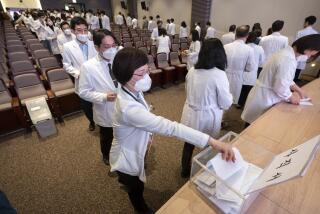An Ailing Profession : Medicine: New doctors enduring the challenges and rigors as first-year interns face a future clouded by skyrocketing costs and impending health-care reforms.
- Share via
The doctors for the 21st Century have arrived in force at Los Angeles County/Harbor-UCLA Medical Center, armed with their spanking-new medical degrees and eager to begin treating patients.
Yet many of the young physicians starting their internships this summer are doing so on a note of trepidation, unsure what awaits them in the brave new world of health-care reform. After devoting countless hours and many thousands of dollars to their medical education, they enter medicine just as the rules are about to change.
Clouding the future are the Clinton Administration’s still-evolving proposals to contain medical costs while increasing access to health care. The plans, being drafted under the direction of Hillary Rodham Clinton and slated for release in September, are expected to call for a “managed competition” system that would rein in physicians’ time-honored independence.
“Nobody has an answer. Nobody knows what’s going to happen,” says Robert Gazmarian, 29, an intern in general surgery.
In all, about 100 interns began their training last month at Harbor-UCLA, the 553-bed medical center near Torrance that is one of the county’s primary teaching hospitals. The term internship generally applies to the first year of residency; interns have their medical degrees but will not be licensed in California until they finish their first year of training and pass exams.
Clad in white coats or green scrubs and equipped with telephone pagers, they spend 80, 90, sometimes 100 hours a week at the hospital tending to their first patients. One intern describes arriving at work in the pre-dawn darkness and departing long after sunset. Another compared his first two weeks to “being thrown in the deep end of the pool.”
With medical school graduation just a few weeks behind them, many are still unaccustomed to introducing themselves as “doctor.”
“It’s hard to get used to,” one confessed.
The interns face a far different social climate than did earlier generations of doctors. As health-care costs soar, public-opinion polls have shown that a large portion of Americans believe doctors’ fees are partially to blame. Veteran physicians, for their part, complain about burgeoning insurance premiums and paperwork.
Add the prospect of sweeping reform, and a medical degree no longer seems a passport to the stable, well-respected lifestyle that impressed many of the interns when, as children, they watched “Marcus Welby, M.D.,” a popular television show that aired from 1969 to 1976.
These young physicians, who receive $27,000 annually as interns, wince at what they call “doctor-bashing,” criticism that doctors are overpaid and driving up medical costs.
“I don’t like the fact (that) the public thinks it’s all the doctors’ fault,” said Allyson Gonzalez, 31, an intern in obstetrics and gynecology. “We’re the ones that face the public. The pharmaceutical companies don’t have to face the public. We’re getting blamed for a lot of things that we’re not the cause of.”
The Harbor-UCLA interns agree that some kind of health-care reform is needed, especially to extend care to the 37 million Americans lacking insurance.
“It’s been very frustrating to me to see the lack of access to health care we’ve had in this country,” said Elizabeth Morrison, 29, an intern in family medicine. “I’m excited to see the changes going on.”
Like many of his colleagues, 26-year-old Patrick Pearsall said he will be willing to make some sacrifices if reforms can extend medical care to those who lack it. But Pearsall, an intern in general surgery, worries about rules that, for instance, might limit the number of tests a doctor can order for a patient. What if a patient could benefit from a high-tech CAT scan, but an insurance company refuses to approve the test?
“Things like that could really frustrate people,” said Pearsall.
The managed competition system favored by the Clinton Administration would combine elements of regulation and free enterprise. Doctors and patients alike would join prepaid medical plans such as HMOs that would compete with one another. Working within such networks, doctors would charge set fees and have to get network clearance before undertaking major procedures in order to keep costs down.
Fears of intrusive regulation were voiced by many interns, such as John Dobak, 27, who said his concerns about loss of autonomy were a factor in his decision not to become a surgeon. Dobak, who just began a one-year transitional internship at Harbor-UCLA, plans instead to combine research and clinical medicine, perhaps in an academic setting.
“People make enormous financial and personal sacrifices to become physicians,” said Dobak. “You don’t spend 15, 16 years in an intensive educational environment to have someone reading rules out of a book, telling you what to do. It’s kind of disheartening. . . . The art of medicine can get lost in all this.”
Sang Pak, a 29-year-old surgical intern considering a career in cardiovascular surgery, said: “It’s on my mind a lot. We’re all worried about the amount of autonomy we have in terms of the freedom we have to practice medicine.”
Doctors in HMOs frequently earn less money and are subject to stricter cost guidelines than their counterparts in traditional fee-for-service practices. Though HMOs are expected to play a prominent role under managed care, only one of eight interns interviewed by the Times--Pearsall--is seriously considering working for one. He says he is attracted by the regular working hours of HMOs and large group practices. The old-fashioned solo practice, he said, “is like being on call every night.”
Managed competition is expected to create many new jobs for primary-care physicians--those in family medicine, internal medicine or pediatrics. These doctors would be expected to emphasize preventive care and serve as “gatekeepers,” making referrals to specialists. To meet the demand for such physicians, some policy-makers support incentives to encourage medical students to enter primary care instead of more lucrative and prestigious specialties.
Gazmarian fears doctors might be ordered to enter certain fields. “It’s an awkward situation,” he said. “It’s like somebody telling you (that you) can’t go into writing but (that) you can go into advertising.”
Gazmarian and Pearsall, like the majority of new doctors, plan to enter specialties instead of primary care.
Indeed, the Assn. of American Medical Colleges reports that fewer than 12% of recent medical-school graduates chose residencies in family practice. One reason could be that specialties pay better: Radiologists earned a 1991 median net income of $238,000 and anesthesiologists earned $210,000, compared to a relatively paltry $98,000 for family practitioners.
Even so, some interns training in primary care believe their field will command new respect and opportunities under the plans being devised in Washington.
Says Phyllis Cohen, an intern in family medicine: “I thought it was the direction medicine was going. That there were too many specialists and too many people who didn’t have basic care. Insurance companies and people were beginning to realize that.” Several interns said they are unconcerned about predictions that health-care reform will mean they could earn less than earlier generations of doctors.
“I’ll be paid more than I earn now. I’ve never had that money. It doesn’t exist for me. In my mind, I’m going to have a ton,” said Pearsall. If he wanted to make enormous sums of money, he said, he would have chosen investment banking.
Nonetheless, the huge burden of school debts can weigh heavily on the minds of interns. Gazmarian owes $59,000. Gonzales owes $42,000. Morrison owes about $90,000 and still plans to work at a lower-paying community health clinic; she hopes to find a service program that will help repay her loans.
“It is scary, if you have a lot of debt. Some people are worried about going into primary care,” said Morrison, who heard such concerns from medical students last year when she worked in Washington as president of the American Medical Student Assn.
Morrison wants to see more medical students and young doctors get involved in the health reform debate, perhaps by writing letters to the Clinton task force or their congressional representatives.
“Face it,” she said, “We’re the ones who are going to be the practicing physicians in five or 10 or 20 years.”
The Interns Name: Dr. Robert Gazmarian, 29
From: East Los Angeles
School: UC Irvine College of Medicine
Field: Intern in general surgery
Goal: Surgical subspecialty in group practice
“No matter what happens, it’s still going to be a well-respected profession. And hopefully, the people who don’t have insurance are going to get to see somebody.”
Name: Dr. Allyson Gonzalez, 31
From: New York City area
School: Cornell University Medical College
Field: Intern in obstetrics and gynecology
Goal: Obstetrician/
gynecologist in group practice
“It seems to be a relatively negative public atmosphere that we’re coming out into. I don’t think that was necessarily true 10 years ago.”
Name: Dr. Patrick Pearsall, 26
From: Houston
School: UCLA School of Medicine
Field: Intern in general surgery
Goal: Pediatric or colon/rectal surgeon in large group practice or HMO; teaching
“It definitely seems like there’s not nearly as much of the ‘idol-worship’ status of being a doctor--that your word is golden and everything goes. Now, it’s open to question, to scrutiny . . .”
Name: Dr. Elizabeth Morrison, 29
From: Brockport, N.Y.
School: Brown University School of Medicine
Field: Intern in family medicine
Goal: Family practice in urban community health center
“Right now, we’re entering a health-care system that I believe is in crisis in terms of not meeting society’s needs. We’re not having enough physicians going into the areas where they’re needed.”
More to Read
Sign up for Essential California
The most important California stories and recommendations in your inbox every morning.
You may occasionally receive promotional content from the Los Angeles Times.










